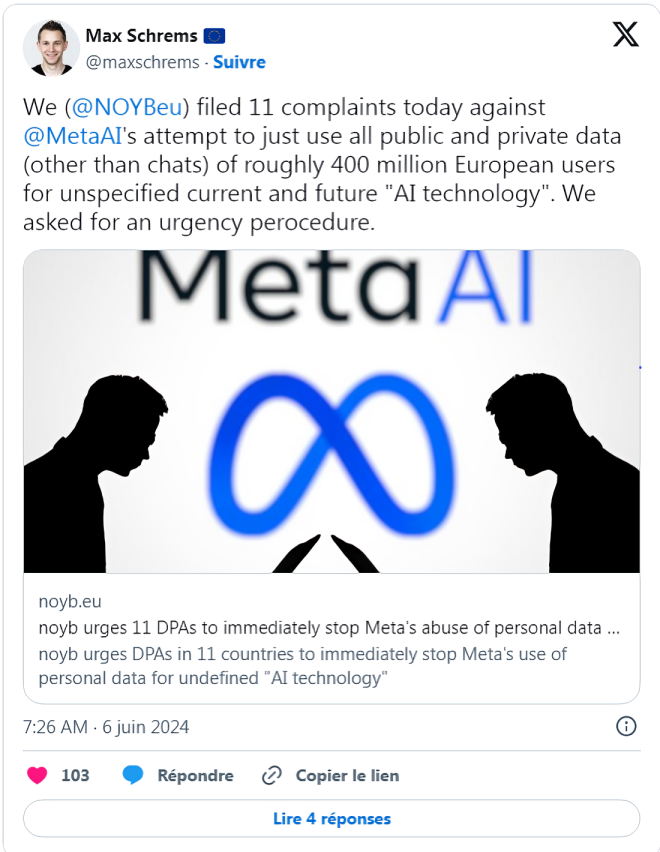Meta's AI Odyssey: Data Privacy Showdown Unfolds Across Europe
In a seismic development that threatens to shake the foundations of data privacy and user autonomy, the American social media behemoth Meta (Facebook, Instagram) finds itself embroiled in a legal firestorm as complaints have been lodged against the tech titan in a staggering 11 European nations. The crux of the contention? Meta's alleged plans to employ user data in an "illegal" manner to fuel its ambitious artificial intelligence (AI) endeavors, as alleged by the privacy advocacy group Noyb (None of Your Business).
The Vienna-based organization, a formidable adversary of tech giants and an unwavering champion of safeguarding online privacy and data protection rights, has sounded the clarion call for urgent intervention by regulatory authorities. Their objective? To preemptively thwart Meta's proposed revisions to its privacy policy, slated to take effect on June 26th, which could pave the way for unprecedented data exploitation.

While the utilization of public data to train generative AI models is already a common practice, Meta's ambitions extend far beyond the conventional. The social media colossus seeks to commandeer the vast troves of personal data amassed from its billions of users since 2007, repurposing it for an "experimental AI technology without limits," as asserted by Noyb's communiqué.
"They're essentially saying they can use 'any data from any source for any purpose and make it available to anyone in the world,'" denounces Max Schrems, Noyb's founder, his words laced with palpable concern. The potential applications of such unbridled data access remain shrouded in uncertainty – could it beget a benign conversational chatbot, or could it unleash the specter of invasive targeted advertising, or even pave the way for the development of lethal autonomous drones? The ambiguity itself is a cause for trepidation.

Crucially, Meta's purported plans circumvent the fundamental tenet of user consent, a cardinal principle enshrined within the European Union's General Data Protection Regulation (GDPR). "Once in the system, users seem to have no possibility to have their data deleted," Noyb laments, referring to the much-vaunted "right to be forgotten" in the digital realm.
While the initial salvo has been fired across 11 nations, including France, Belgium, and Germany, Noyb has vowed to escalate its offensive to the remaining European Union member states "in the coming days." The organization's track record is formidable, having catalyzed administrative fines totaling over €1.5 billion against Meta alone through its relentless pursuit of online privacy safeguards.
As this legal maelstrom gathers momentum, the ramifications reverberate far beyond the confines of Meta's corporate boardrooms. At stake is nothing less than the delicate balance between technological innovation and the inviolable rights of individuals to maintain sovereignty over their personal data. The outcome of this titanic clash will undoubtedly shape the contours of the digital landscape for years to come, reverberating across the halls of legislative bodies and courtrooms alike.
-
15:40
-
15:15
-
14:50
-
14:20
-
14:00
-
13:50
-
13:40
-
13:20
-
13:00
-
12:50
-
12:30
-
12:20
-
12:00
-
11:50
-
11:50
-
11:30
-
11:20
-
11:00
-
10:50
-
10:30
-
10:20
-
10:00
-
09:50
-
09:30
-
09:20
-
09:00
-
08:50
-
08:30
-
08:20
-
08:00
-
07:50
-
07:45
-
07:30
-
07:15
-
07:00
-
19:20
-
18:50
-
18:30
-
18:20
-
18:00
-
17:50
-
17:30
-
17:20
-
17:00
-
16:50
-
16:45
-
16:30
-
16:20
-
16:12
-
16:00
-
15:50
-
15:41


